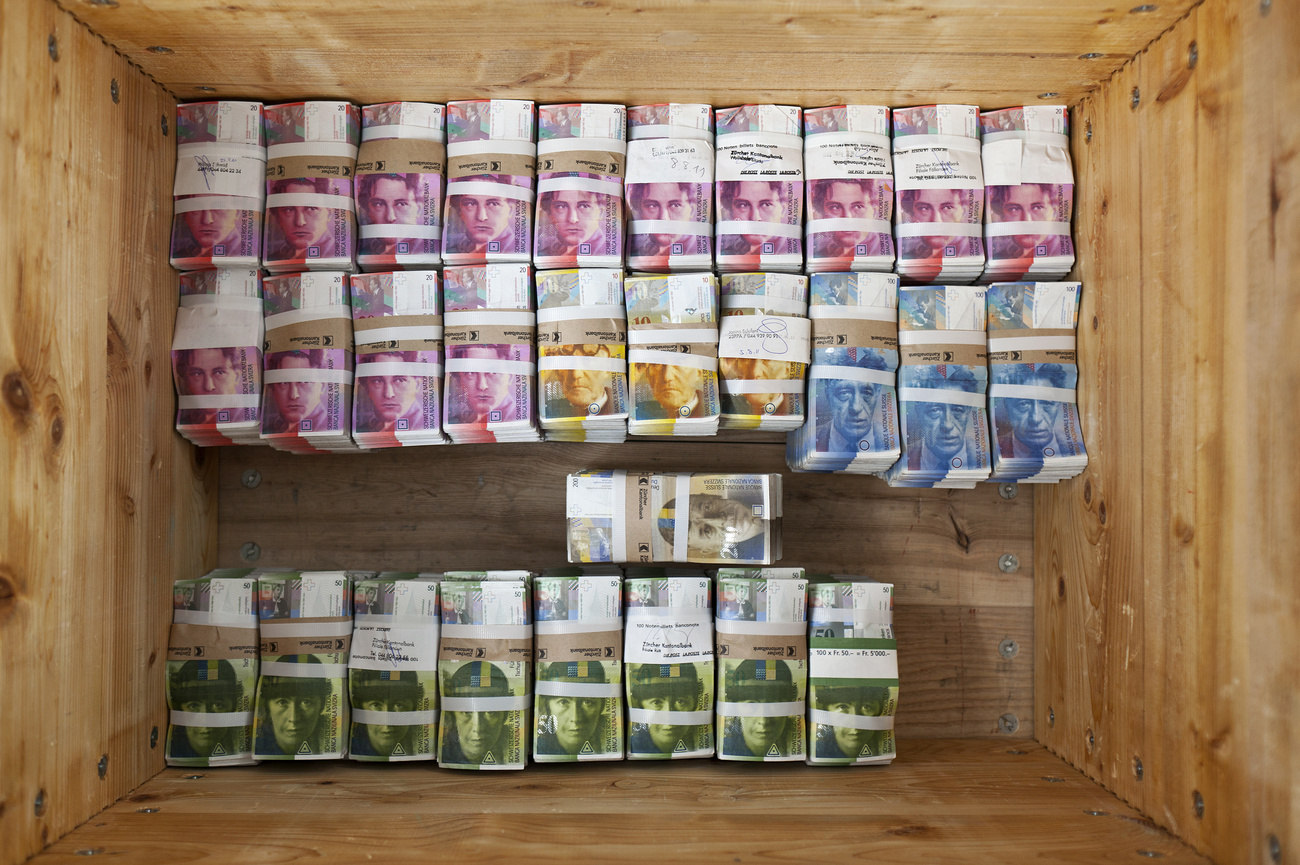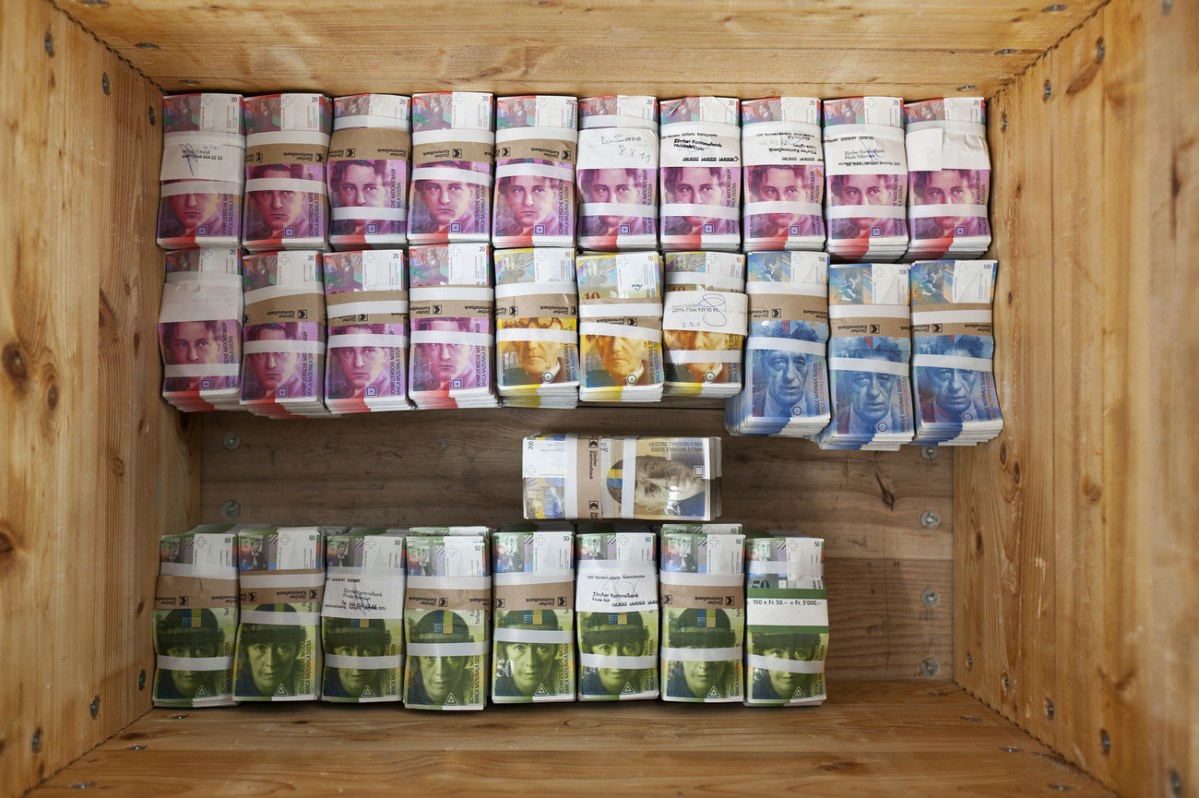
Switzerland has so far returned over $2 billion in misappropriated funds to their countries of origin.
Keystone / Martin Ruetschi
Listen to the article
Listening the article
Toggle language selector
Generated with artificial intelligence.
The tough task of stopping illicit financial flows and returning stolen assets is being complicated by slow progress and waning US leadership.
This content was published on
September 11, 2025 – 09:00
Geraldine Wong Sak Hoi

Reporter specialised in Swiss foreign affairs, with a side hustle as a sub-editor in the English Department.
Previously my focus was on disinformation and fact-checks, which I still produce occasionally.
When public officials steal millions from state coffers, it’s ordinary people who suffer.
In Nigeria, for example, patients seeking treatment at understaffed hospitals fail to receive proper care, said David Ugolor, executive director of the Africa Network for Environment and Economic Justice (ANEEJ). The lack of money to repair classrooms means fewer children in school, while roads that go unrepaired increase the risk of traffic accidents.
The problem in Nigeria, Ugolor said, “has gone beyond corruption – it’s state capture”. That means corrupt elites not only steal money but twist the law to maintain control. “And it’s deepening inequality and poverty in the country,” he said.
Each year, Africa loses almost $90 billion (CHF72 billion) as corrupt officials and criminals send their ill-gotten gains out of the continent, the United NationsExternal link estimates. As a result, state investment in healthcare may be cut by half in affected countries and education by a quarter.
Some European and North American nations, amid a rash of scandals at their own banks, have targeted accounts held by foreign kleptocrats. Switzerland has so far returned over $2 billion in misappropriated funds, while the European Union adopted a new directiveExternal link in 2024 setting out rules for recovering illicit assets in its 27 member states.
Answering readers’ questions about Swiss diplomacy
This article is in response to a question from a Swissinfo reader who asked if it is true that foreign leaders, such as those in Africa, have hidden money in Swiss banks. If you have a question about Swiss trade or diplomacy that you’d like us to answer, get in touch by leaving a comment.
It’s a drop in the ocean. “We’re still seeing a lot more money being taken out of [developing countries] and moved into private hands than is being returned,” said Jackson Oldfield, director of the Germany-based Civil Forum for Asset Recovery (CiFAR).
Yet even as advocates call for a stronger and faster response, some fear that Western nations may no longer prioritise the fight against kleptocracy. Those concerns are only compounded as the United States, previously a driving force, withdraws from its global commitments.
Sending ‘the wrong signal’
The fight against illicit finance in the US received a blow after a dedicated Kleptocracy Asset Recovery Initiative at the Department of Justice was disbandedExternal link in the early days of President Donald Trump’s second term.
The administration has also pausedExternal link enforcement of the Foreign Corrupt Practices Act and skipped meetings of the Organisation for Economic Co-operation and Development Working Group on Bribery.
“It has sent the wrong signal and is actually incentivising African governments that are corrupt,” said Ugolor at ANEEJ. “This is really unfortunate, particularly when we reflect back on the struggle to get this issue on the global agenda.”
Achievements have been hard won, from the inclusion of restitution as a key part of the 2004 UN Convention on Corruption, to the US and Britain hosting the Global Forum on Asset Recovery in 2017, where principlesExternal link were adopted for transferring stolen resources.
From pioneer to subject of criticism
Over the past decade, Switzerland has also played a leading role, the country’s foreign ministry told Swissinfo, such as fostering international exchanges of information on cases. The country remains “strongly committed” to asset recovery, the ministry added, and “is taking measures to combat corruption” both domestically and internationally.
The crooked billions it has handed back are the result of decades of gradual work to shed its image as a centre for illicit finance. Switzerland tightened money-laundering legislation after becoming the first country, in 1986, to pre-emptively freeze the bank accounts of a corrupt leader: Ferdinand Marcos of the Philippines. By 2016, it had introduced a lawExternal link on returning foreign illicit assets.
A high point was the 2018 transfer to Nigeria of $321 million, part of the money stolen by former dictator Sani Abacha, who ruled in the 1990s, and his family. It marked the first time civic groups helped decide on and supervise where the cash went. Over 200 NGOs, led by ANEEJ, oversaw transfers to people living in poverty.
“That was a success because for the first time money came to Nigeria that we could trace to beneficiaries in different parts of the country,” said Ugolor. “The process went smoothly, and it has increasingly become the standard.”
The same approach is being used to restitute some $313 million to Uzbekistan. Part of that is funding the renovation of maternity unitsExternal link.
Still, the Swiss record on asset recovery – identifying, freezing, confiscating and returning stolen money – isn’t blemish-free. An earlier tranche of the Abacha funds saw much of the $700 million transferred reportedly disappear. A 2022 federal auditExternal link found weaknesses in the Swiss system. The 2016 law, the audit office said, is too limited and therefore difficult to use in practice.
Progress can also be slow. Swiss officials sometimes promise quick results when cases take years or decades to resolve. A total of CHF683 million in Marcos funds were returned to the Philippines after 60 court rulings over 18 years, though Bern has since updated legislation to speed up the process. Still, more recently, it took the Federal Court two years to rule on an appeal against a cantonal court decision to restitute CHF8 million to Peru in the case of the country’s former intelligence chief, Vladimiro Montesinos. This is “too long and unacceptable”, Oscar Solórzano from the Basel Institute on Governance toldExternal link Swiss investigative newsletter Gotham City.
More

More
Dictators’ funds in Switzerland – the biggest scandals
This content was published on
Jun 2, 2022
From Marcos to Yanukovych via Mubarak, a rogues’ gallery of former leaders who have stashed their stolen cash in Switzerland.
Read more: Dictators’ funds in Switzerland – the biggest scandals
The audit office has also pointed to a lack of transparency, with no single register of cases. The Financial Action Task Force (FATF), an international body that fights money laundering, recommends keeping “comprehensive statistics” to improve asset recovery.
The foreign ministry confirmed to Swissinfo that a centralised register does not exist, as several cantonal and federal bodies are involved. But, it said, the government has followed some of the other audit office recommendations. Switzerland has also “deepened strategic partnerships” with institutions such as the UN Office on Drugs and Crime and its Stolen Assets Recovery (StAR) programme, it said.
StAR runs a database with records on around $17 billion in ill-gotten assets from a total of 560 cases worldwide. However, this data is just the tip of the iceberg as, according to one estimateExternal link, less than 1% of the world’s illicit funds are intercepted.
Weaknesses in prevention
Switzerland is not alone in struggling to handle complex cases. British think-tank the Royal United Services Institute said the UK has “a persistent dirty money problem” and its processExternal link for tackling kleptocracy is simply “not effective”. Among issues are a lack of “shared vision” among the 20 government bodies involved and low political priority.
Another challenge across rich countries, despite greater willingness to address banking secrecy and beneficial ownership, is weak prevention, said Oldfield at CiFAR.
More

More
Inside SWI
Our weekly newsletter on foreign affairs
Switzerland in a fast-moving world. Join us to follow the latest Swiss foreign policy developments. We offer the perfect immersive package.
Read more: Our weekly newsletter on foreign affairs
“We still have plenty of secrecy jurisdictions, including in Europe, where it’s possible to set up shell companies and hide behind them,” he said.
One ongoing case involves Riad Salameh, Lebanon’s former central bank governor who, along with his brother Raja, has been charged with a raft of alleged crimes including embezzling public funds. The SonntagsZeitung newspaper reportedExternal link that $330 million was deposited in accounts in Switzerland via an offshore companyExternal link. The brothers have denied the allegations.
The Swiss parliament is now considering tighter measures, including a federal register of beneficial owners of companies and due-diligence rules for legal advisors. However, Transparency International’s Swiss chapter arguesExternal link that these plans would still fail to bring the Alpine nation in line with international standards.
Restitution ‘is their right’
As Switzerland and other countries make slow progress on asset recovery and the US retreats from previous undertakings, Ugolor said “the political momentum around tackling illicit financial flows” is waning. While his native Nigeria has benefited from past Swiss, US and UK leadership and recovered upwards of $3 billion, “you’re talking about a very limited amount” compared to what has been stolen, he said.
For ordinary Nigerians, the stakes couldn’t be higher. Their country ranks 140 out of 180 countries in Transparency International’s 2024 corruption indexExternal link. Around 40% of the population is deemedExternal link poor.
For rich nations, too, there will be consequences if they fail to prioritise the issue.
“It’s not charity,” said Ugolor. Handing back stolen money to citizens “is their right”.
“Young people don’t have jobs,” he said. “The danger is that when corruption continues to steal away their future, they have no option than to move to Europe. If [countries] tackle kleptocracy, there will be prosperity in Africa.”
Edited by Tony Barrett/vm/ts
More
Have you heard something about Swiss diplomacy that you’d like us to fact check?
Not all information circulating about Switzerland’s foreign relations is accurate or well understood. Tell us what you’d like us to fact check or clarify.
View the discussion
Articles in this story
